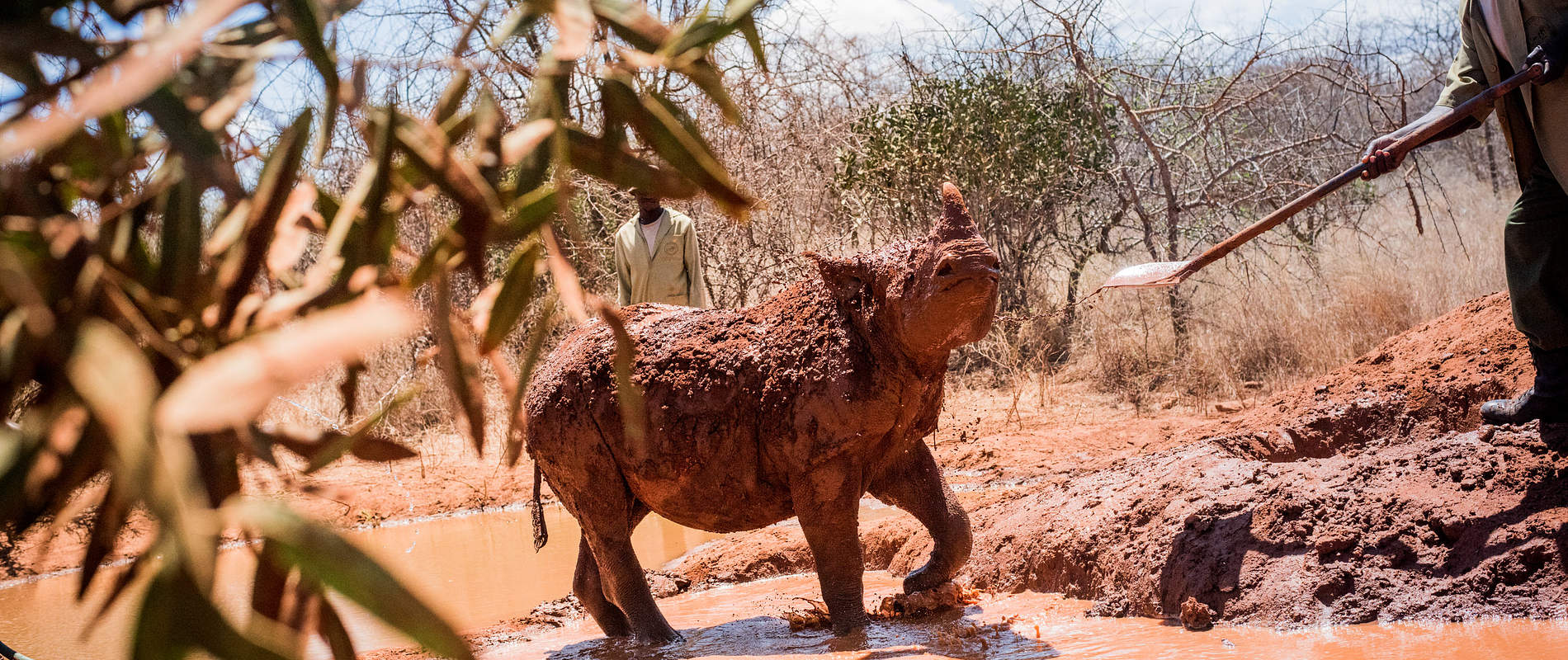Our baby is not so little anymore. One glance at his stubby horn and sturdy build, and it’s easy to picture what an impressive black rhino he will be when fully grown. However, that day is still far away, and he remains reliant on his Keepers and the round-the-clock care he receives at our Kaluku Field HQ.
Apollo came into our world on 21st September 2019, after we received reports that an orphaned rhino had been found standing beside his dead mother. Rescuing a rhino is always a tricky operation, but as our teams headed to the scene in Tsavo West National Park, we couldn't have imagined just how complicated this particular mission would be. In the dramatic operation that unfolded, it took two aircraft and several teams to bring the six-month-old calf to safety. Even at that age, he was built like a little tank and could pack a serious punch.

Apollo was just six months old when he was rescued.
Now 19 months old, Apollo has been in our care for a full year. From his home at our Kaluku Field HQ, he has all of Tsavo at his doorstep, and spends his days exploring the wilderness that he will one day call home. Right now, it is searingly hot, and our pampered boy has been enjoying the slower pace of life that the dry season brings. Refreshed from a good night’s sleep, he happily charges around the Kaluku compound throughout the mornings, when it is still cool. Once the temperature begins to rise, he makes a beeline for his favourite mud bath — a spot that is also frequented by wild elephants, though never at the same time. This might be Apollo’s preferred time of day; basking in the cool water, and wriggling around as his Keepers apply a protective coat of red mud all over his body, before flopping down in the soft earth for a generous dusting.



During the milder months, Apollo would erupt from these pampering sessions in high spirits, galloping back and forth with gusto for a good 20 minutes. Now, as the midday mercury pushes upwards, he spends the hottest hours in repose under the shade of the tamarind trees. Here he sleeps for up to two hours, while his Keepers also enjoy a well-deserved break and eat their lunch. The resident hornbills take this opportunity to swoop in and enjoy the rice handouts they have become accustomed to. They brazenly hop about, jumping over the slumbering rhino, who remains oblivious to their antics.
When he is ready to move on to the next activity, Apollo lets out his characteristic snorts and then leads his little band to a new area. He is getting bolder and more confident, expanding his palette, sampling different greens and, all in all, becoming more experimental with his browsing sessions. These daily adventures are vital, allowing Apollo to hone his instincts and learn the ways of the wild so that one day, when he is big enough to fend for himself, he can lead a totally independent life.

As the sun begins to sink and the temperature dips slightly, Apollo gets another boost of energy. Some days, he runs along the luggas (seasonal watercourses), kicking up white sand with every step. Others, he delights in chasing the wild animals that live in the Kaluku vicinity. Thanks to this year’s extended rainy season, Kaluku is positively aflutter with guinea fowl chicks and Apollo takes great delight in charging into their midst, which always creates quite a stir.

Apollo must have a built-in alarm clock because, at exactly 4.30pm every afternoon, he wanders in the direction of his stockades. He doesn’t want any delay, and if he thinks the Keepers are taking him on a roundabout route home, he simply walks in front of them and charts a more direct course. Without any coaxing, he walks into his stable, where he enjoys a generous drink of water before slurping down a bottle of milk. Given that Apollo seems to be growing by the minute, we have removed the middle partition in his stockade, doubling its size.

One thing he has not yet outgrown is his mattress, which he still insists on hoisting over his back each night, creating his own makeshift tent, before drifting off to sleep! His attachment to his mattress is a reminder that, while Apollo has come a long way since we rescued him, he is still very much a baby and will be reliant on us for many years to come.
